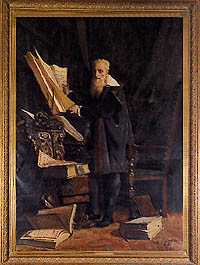|
Julius Caesar Scaliger
(1484-1558)
[From Columbia Encyclopedia] Italian philologist and physician in
France. Renouncing a military career because of bad health, Scaliger
studied medicine and in 1525 went as physician to Agen, where he was
naturalized as a French citizen. He quarreled with Erasmus and Cardan,
denouncing the former as a parasite and proofreader.
In
his De causis linguae Latinae (1540) he analyzed Cicero's style and
pointed out over 600 errors of his humanist predecessors. He wrote
commentaries on the medical and botanical writings of Hippocrates,
Theophrastus and Aristotle, and urged an improved classification of
plants according to their unique characteristics. His famous ars
poetica used Plato and Aristotle and added the rule of unity of place
in the drama.
Scaliger admired Seneca, whom he did not consider surpassed by any
Greek tragic writers.
Addenda
He was the father of Joseph Justus Scaliger (1540-1609).
For further study: The history of the Della Scala family of Verona
Scaliger also spelled SCALIGERI (b. April 23, 1484, Riva, Republic of
Venice [Italy]--d. Oct. 21, 1558, Agen, Fr.), French classical scholar
of Italian descent who worked in botany, zoology, grammar, and
literary criticism.
 He claimed to be a descendant of the Della Scala
family, whose Latinized name was Scaligerus and who had ruled the
Italian city of Verona during the two preceding centuries. Scaliger
became known as a scholar through two virulent orations in 1531 and
1536 against the Ciceronianus of Erasmus, written in vigorous and
trenchant Latin. The views on Ciceronianism with which Scaliger
countered Erasmus, however, are considered narrow and shortsighted;
Scaliger largely misunderstood the purpose of Erasmus' ridicule of the
stylistic excesses of contemporary Ciceronians. He claimed to be a descendant of the Della Scala
family, whose Latinized name was Scaligerus and who had ruled the
Italian city of Verona during the two preceding centuries. Scaliger
became known as a scholar through two virulent orations in 1531 and
1536 against the Ciceronianus of Erasmus, written in vigorous and
trenchant Latin. The views on Ciceronianism with which Scaliger
countered Erasmus, however, are considered narrow and shortsighted;
Scaliger largely misunderstood the purpose of Erasmus' ridicule of the
stylistic excesses of contemporary Ciceronians.
Little is known of Scaliger's early life. In 1525 he left Italy to
become physician to the bishop of Agen at Quienne, where he spent the
rest of his life, becoming a French citizen. Except for a tract on
Hippocrates' De insomniis (1539; "Concerning Bad Dreams"), his
scholarly work was published late in his life and consisted largely of
discussions of standard authors.
His dialogue De plantis (1556) is a commentary on the book on plants
wrongly ascribed to Aristotle, and his Exercitationes exotericae de
subtilitate (1557; "Esoteric Exercises in Subtlety") discusses
scientific and metaphysical problems raised in De subtilitate rerum
("On the Subtlety of Things") by the eminent naturalist Geronimo
Cardano. An unfinished commentary on Aristotle was published in 1619
and one on Theophrastus in 1644.
His De causis linguae latinae (1540; "On the Subject of the Latin
Language") was an interesting early attempt to discuss the principles
of Latin grammar. His Poetice (1561; "Poetics") became his most widely
read book. In it Greco-Roman rhetoric and poetics are used as a
foundation for literary criticism, and his exposition of Aristotelian
criteria for tragedy did much to turn his contemporaries toward
Classicism. Thoroughly conversant with Latin and Greek writers, a
competent textual critic, and a prolific composer of Latin verse,
Scaliger was chiefly interested in developing an understanding and
critical evaluation of the ancients. His teaching impressed a whole
generation of savants in the great age of French classical
scholarship.
Copyright 1994-1998 Encyclopaedia Britannica
|




 He claimed to be a descendant of the Della Scala
family, whose Latinized name was Scaligerus and who had ruled the
Italian city of Verona during the two preceding centuries. Scaliger
became known as a scholar through two virulent orations in 1531 and
1536 against the Ciceronianus of Erasmus, written in vigorous and
trenchant Latin. The views on Ciceronianism with which Scaliger
countered Erasmus, however, are considered narrow and shortsighted;
Scaliger largely misunderstood the purpose of Erasmus' ridicule of the
stylistic excesses of contemporary Ciceronians.
He claimed to be a descendant of the Della Scala
family, whose Latinized name was Scaligerus and who had ruled the
Italian city of Verona during the two preceding centuries. Scaliger
became known as a scholar through two virulent orations in 1531 and
1536 against the Ciceronianus of Erasmus, written in vigorous and
trenchant Latin. The views on Ciceronianism with which Scaliger
countered Erasmus, however, are considered narrow and shortsighted;
Scaliger largely misunderstood the purpose of Erasmus' ridicule of the
stylistic excesses of contemporary Ciceronians.